#cairo university egypt 2023
Text
Edurizon Pvt Ltd: Your Trusted Partner in Medical Education
Introduction
In the heart of the vibrant and historically rich city of Cairo, Egypt, stands an institution that has been a beacon of medical education and healthcare excellence for over half a century – Cairo University Faculty of Medicine. Edurizon Pvt Ltd is excited to take you on a journey through this prestigious institution, showcasing its rich history, remarkable facilities, and its pivotal role in shaping the future of healthcare in Egypt and beyond.
A Legacy of Excellence
Founded in 1942, Cairo University Faculty of Medicine has a storied history of academic excellence and medical innovation. The institution has produced some of the most accomplished and influential medical professionals in Egypt and the world. Its commitment to nurturing talent and fostering a culture of research and innovation has made it a leader in the field of medicine.
State-of-the-Art Facilities
Cairo University Faculty of Medicine is renowned not only for its exceptional faculty but also for its cutting-edge facilities. The institution has consistently invested in providing students with the latest tools and resources, ensuring they receive world-class medical education. Some of the remarkable facilities at the Faculty of Medicine include:
University Hospitals: The faculty operates several teaching hospitals, where students gain practical experience in various medical specialties. These hospitals are equipped with modern medical equipment, allowing students to learn from the best while serving the community.
Research Centers: The faculty boasts several research centers dedicated to various medical disciplines. From cardiovascular research to genetics and molecular biology, students and faculty collaborate on groundbreaking research projects that have a global impact.
Libraries and Laboratories: State-of-the-art libraries and laboratories offer students access to an extensive collection of medical literature and advanced research facilities. These resources empower students to explore, learn, and innovate.
Simulation Centers: The faculty provides medical students with cutting-edge simulation centers that replicate real-life medical scenarios. This hands-on experience ensures that students are well-prepared for the challenges they will face in their medical careers.
Lecture Halls and Classrooms: The faculty offers spacious and well-equipped lecture halls, ensuring that students receive the highest quality of education. With a blend of traditional teaching methods and modern technology, the learning experience is truly enriching.
Shaping the Future of Healthcare
Cairo University Faculty of Medicine is not just about academic excellence and world-class facilities. It plays a pivotal role in shaping the future of healthcare in Egypt and beyond. Here's how:
Medical Research: The faculty's commitment to medical research has resulted in numerous breakthroughs in healthcare. Its researchers work tirelessly to address pressing health issues and develop innovative solutions that benefit society at large.
Quality Medical Professionals: Cairo University Faculty of Medicine produces well-rounded medical professionals who are not only highly skilled but also compassionate and committed to improving the health and well-being of their patients.
Community Engagement: The faculty actively engages with the local community, providing medical services, health education, and outreach programs that address the pressing healthcare needs of the population.
Global Collaboration: Cairo University Faculty of Medicine collaborates with international institutions and organizations, fostering a global perspective on healthcare and promoting the exchange of knowledge and expertise.
Conclusion
Cairo University Faculty of Medicine, under the able guidance of Edurizon Pvt Ltd, stands as a beacon of hope and a symbol of excellence in the field of medical education and healthcare. Its rich history, world-class facilities, and dedication to shaping the future of healthcare make it an institution that continues to inspire and lead the way in the ever-evolving world of medicine. With a commitment to innovation and community service, it is undoubtedly contributing to a healthier and better world for all.
#cairo university#cairo university faculty of medicine#cairo university egypt#ain shams university#mbbs in egypt#cairo university campus tour#cairo university campus#faculty of medicine cairo university#study mbbs in egypt#cairo university tour#cairo university vlog#visiting to cairo university#cairo university egypt 2023#cairo medical university#mbbs in cairo university#cairo university in 4k#cairo university in giza#ain shams university egypt#bestmbbsconsultants#bashkir state medical university#mbbsrussia#kazan#kazanfederaluniversity#kazanfederal#edurizon#youtube#russia#mbbsinrussia
0 notes
Text
In recent months, Rafah in the southern Gaza Strip has experienced population expansion on a dramatic scale. Before the war, the Rafah area, which abuts the Egyptian border, was home to around 275,000 people. Now, an estimated 1.5 million people are crammed in there, many in tent cities visible in satellite images.
In February, U.N. Secretary-General António Guterres warned that an Israeli military operation in Rafah, as Israeli officials have repeatedly said they are planning to do, “would exponentially increase what is already a humanitarian nightmare with untold regional consequences.”
This latest armed conflict began on Oct. 7, 2023, when Hamas and other Palestinian militant groups perpetrated mass atrocities against Israel, including killings, brutal mutilations, torture, and sexual assaults. More than 200 Israelis and other nationals were abducted, ranging in age from 10 months to 86 years. More than 100 remain unaccounted for.
In response, Israel unleashed a military campaign of extraordinary intensity. The civilian death toll in Gaza is intolerably high, especially the estimated 14,000 Palestinian children who have been killed. Israel says Rafah is the last stronghold of Hamas and in the absence of a hostage deal it is intent on continuing its military campaign.
According to the United Nations, famine is imminent. The World Bank and U.N. also estimate that more than 60 percent of all homes in the territory have been damaged or destroyed as well as vital medical and civilian infrastructure. In all, some 1.7 million Palestinians have been internally displaced.
So why, in a war of this intensity, are there no refugees? Or perhaps the question should be asked in a slightly different way: Where are the refugees from Gaza?
The simple answer is that most Palestinians are trapped within Gaza behind fortified borders, impregnable to all but those with international passports or exceptional connections. According to the Egyptian government, nearly 4,000 people have been evacuated into the country for medical treatment along with their families. A further 67,000 foreign and dual nationals have also been able to leave, but these are not refugees, and most foreign and dual nationals will have since moved on from Egypt.
By way of comparison, at the end of last year 6.5 million refugees from Syria and nearly 6 million Ukrainians were being provided protection outside their countries. In any conflict of this scale and with this magnitude of pain and suffering, one would anticipate a mass influx of refugees into surrounding countries. There have been few situations in living memory where an entire blockade has prevented people from escaping imminent threats to life and limb.
It is remarkable that more than six months into this conflict so few people have had the chance to leave, even though there are daily statements from international organizations that there is no safe place in Gaza; even though UNRWA, the U.N. agency for Palestinian refugees, says it cannot provide protection or assistance; and even as the international community says humanitarian relief is not reaching those most in need.
Wherever people flee from or to, states are prohibited from sending anyone to face risks of war, torture, or persecution. This universal obligation includes letting people escape, giving sanctuary for as long as the threat persists and to return safely when conditions allow.
These rights originate in the teachings of the monotheistic religions. According to Islamic migration law, individuals have the right to seek and be granted asylum in any Muslim state. Judaism, whose people have long fled persecution, has a biblical principle of welcoming and protecting the stranger.
Torture in the conflict is widespread. I have reviewed evidence of the extreme torture perpetrated during the Oct. 7 assault by Hamas and other Palestinian fighters, as well as reports of ongoing violations against hostages. My office has received allegations of torture and mistreatment by Israeli forces against detained Palestinians. The collective punishment of the Palestinian people is, in my legal opinion, tantamount to torture.
While there is little legal ambiguity and the right to asylum is an apolitical right, there are few more politicized regions than the Middle East. Neighboring Arab countries have historically borne the greatest burden of influxes of fleeing Palestinians, and these influxes have often caused significant political instability in their own states. Israel has an abysmal track record of allowing Palestinians who have fled to reenter.
So it is unsurprising that Arab leaders are now deeply sensitive to any charge of helping to facilitate the mass expulsion of Palestinians from Gaza. This would be a “red line,” according to King Abdullah II of Jordan. The possibility of Palestinians fleeing en masse in a repeat of the Nakba—the displacement of around half the Arab population of Palestine in 1948—haunts leaders in Cairo, throughout the region, and well beyond.
In due course, the International Court of Justice will determine whether there has been a genocide in Gaza. The court’s provisional measures recognize that all states have obligations to prevent genocide, which would include preventing the killings of members of a national group, by, for example, letting them leave the territory.
Despite the complexities of the politics of this conflict, the legal reality is that states cannot pick and choose which human rights obligations to implement. It is self-evident that Israel will not open its borders to Palestinian refugees, but the Israeli state and Egypt have legal obligations to do so. Egypt’s decision to seal its border with Gaza violates international humanitarian law and international refugee law.
Egypt cites security concerns as a reason for not letting in Palestinian refugees, especially given the challenges of militancy in the Sinai Peninsula potentially being aggravated by the arrival of battle-hardened fighters from Gaza alongside civilians. While that threat certainly exists, the international legal framework includes safeguards to protect against this, and robust screening processes must be put in place to ensure that militants do not cross the border alongside civilians.
Early in the conflict, Egyptian Foreign Minister Sameh Shoukry told CNBC that he could see “no reason why Egypt, which is hosting 9 million refugees—hosting them and providing them integration into our society at considerable burden on our economy—should have to bear solely [the] additional influx of Gazans.”
That figure appears to be way off the mark, at least based on the latest UNHCR statistics. The U.N. Refugee Agency says Egypt currently hosts 575,000 registered refugees and asylum-seekers from 61 countries, while another nearly 250,000 refugees have not yet been registered. More than half of those registered are Sudanese, with Syrians forming the next largest group. The estimated number of Palestinians in Egypt is unclear as they are not included in any official figures, but may number in the hundreds of thousands.
Shoukry is right, though, to say that Egypt should not have to bear responsibility for Palestinian refugees alone. Other states and international organizations must support them.
UNRWA serves Palestinian refugees in Jordan, Lebanon, Syria, Gaza, and the West Bank, including East Jerusalem. Under the 1951 Refugee Convention, responsibility transfers to UNHCR outside these areas. In other words, UNHCR is required to support Palestinian refugees who reach Egypt. The Refugee Convention stresses that international cooperation is a foundational principle and that all states must play their part.
There have been reports that Egypt has been clearing land near the border preparing for refugees in the event of widescale fighting in Rafah. The international community and the U.N. have been right to call for a cease-fire and for the immediate and unconditional release of all hostages. With negotiations still proceeding, the humanitarian imperative to save lives must be paramount.
Whenever peace is achieved, the level of destruction will take years to repair. Where and how are Palestinians from Gaza to live in the meantime?
The fact remains that the right to flee and to seek asylum under law is an individual right. Palestinian families, as they consider their future, must be able make this decision for themselves. The U.N.—whether it is UNRWA within the territories or UNHCR in Egypt and beyond—must support Palestinian civilians.
Short-term planning to help relieve pressure on Egypt and other countries receiving any refugees should include offers of medical evacuations, family reunification, and temporary protection transfers into third countries. There must be commitments of return to Gaza as soon as conditions allow. There are many precedents around the world of similar comprehensive strategies by the international community.
Right now, though, civilians in Gaza have no ability to determine their fate. Starvation is becoming ever more likely, and death could come at any moment. Palestinians deserve the opportunity to choose whether they wish to flee, however painful a decision it is.
Alice Jill Edwards is the United Nations special rapporteur on torture.
40 notes
·
View notes
Text

By: Batya Ungar-Sargon
Published: Nov 8, 2023
About a week after the October 7 massacre, I passed a large group of people in an airport who were waiting to check in for a flight to Cairo. One of the women ostentatiously clocked the Jewish star I wear around my neck and started whispering with her compatriots. As I walked by, she shouted at me, “Palestine will be free!”
I chuckled as I walked to my gate, thinking, Not if Egypt has anything to say about it.
Before October 7, I would have considered this whole scene to be wildly offensive. A stranger shouting an anti-Israel slogan at me, holding me responsible for the actions of the Israeli government simply because I am a Jew.
But in the post–October 7 world, I had a different reaction: let her scream.
It’s uncomfortable to be barked at by strangers. It’s not pleasant to find out that your classmates will not condemn the murder of your people, or to hear thousands of them gleefully chanting the slogans of a genocidal death cult committed to your erasure from this planet. It’s unsettling to know that your peers have adopted a worldview that allows them to convince themselves that you are the bad guy, you are the privileged monster who wants babies to burn—even as they justify and celebrate the burning of Jewish babies.
It is scary to realize that the same administration that “protects” your fellow students from every perceived slight and insult will side with them against you as they literally call for your annihilation. It can be deeply isolating to open social media and see post after post calling your people the perpetrators of the exact forms of murderous violence that was done to them not three weeks earlier. And it is maddening to watch those who hate us and wish violence upon us fashion themselves as victims—even as heroes.
But that feeling you get when you are facing those things down, that quickening of your heart rate, the flush on your face, the chill down the spine—these unpleasant sensations are what courage feels like. They are the physical symptoms of a moral compass that works, the manifestations of pride in who you are, of the fact that despite millennia of calls for our murder, we’re still here. You’re still here.
Treasure those feelings. Do not cower. Do not tremble.
I’m not suggesting you put yourself in actual danger. The assaults on Jewish students at Harvard and UMass are crimes and should be prosecuted as such. On Sunday, 69-year-old Paul Kessler dared wave an Israeli flag on a Thousand Oaks street corner and died after being assaulted. His murderer should spend his life behind bars.
But the worst thing that could come out of this moment would be for Jews, especially Jews on campus, to embrace the victimhood narrative that their peers subscribe to—and that universities large and small have reified in sprawling DEI bureaucracies. That worldview is a large part of what has brought us to this moment.
So do not cast your lot as a competitor in the oppression Olympics. Instead, reject that entire way of looking at the world.
Here’s the thing: it’s good to be unpopular with a mob whose worldview has done away with the concept of right and wrong and decided, with a Nazi-like commitment to racial ideology, that you are Jewish and therefore you are white and therefore you are bad. It is good to be unpopular with people who spent the weeks after October 7 on the hunt for Jewish exaggeration, Jewish lies, Jewish crimes. It is good to be unpopular with people who cannot separate evil from power and virtue from skin color. (Unpopularity, for now, is your fate, unless you are willing to cosign your own humiliation and join the left’s token “good Jews” who advocate against Zionism from the comfort of the diaspora for plaudits from the Squad.) We don’t answer to them; we answer to the God of Abraham, Isaac, and Jacob, the Rock of Israel and its Redeemer.
The good news is: it may not feel like it, but this country is on your side. College students are in one of vanishingly few spaces in America that sides with Hamas. Your professors will live and die in irrelevance, signing their names to their silly little letters and coming up with new jargon with which to defend terrorism while nurturing their grandiose hero complexes. Most of your peers will grow up and abandon their radical chic commitments. The progressive movement has taken a big hit, having shown its true colors to a nation that knows what is good and what is right, that can separate barbarism from civilization.
But for now, remember this: to be a Jew is to refuse to kneel and refuse to bow. The stakes of standing upright have never been clearer than they are today, in this post–October 7 world. It’s good to have these people as your enemies, because the world will always have people who oppose what’s right and what’s good, and it is our destiny to fight them. Do it with pride.
==
"Sometimes it's better to be known for one's enemies."
#Batya Ungar Sargon#antisemitism#intersectionality#intersectional feminism#oppressor#oppressed#victimhood culture#victimhood#islamic terrorism#hamas#exterminate hamas#hamas terrorists
22 notes
·
View notes
Text
URGENT DONATIONS!
https://gofund.me/c94cd69e
You can follow him on instagram his name is Saleh Tayeh

My name is Saleh Nawaf Tayeh, and I'm from Deir al Balah in the Gaza Strip. Like everyone in Gaza, on October 7, 2023, my life was turned upside down by the horrors of war and genocide. I was studying engineering at Palestine Technical College where I dreamed of making a positive impact on society, until the occupation tore through Gaza, leaving destruction everywhere. The university I attended was destroyed, along with my aspirations, and everything else in Gaza. Despite everything, I refuse to give up.
My family means everything to me, and right now, they are facing unimaginable challenges. My parents are in Cairo, hospitalized with chronic illnesses that have worsened due to the conflict. With eight siblings to care for, the weight of responsibility is overwhelming. Tragically, my house was bombed and now me and my family have to live in a small room together. The cost of food and survival is high, and we are under the constant stress of bombing, I have to live in fear for my and my family's safety every day.
I am determined to find a way to keep my family safe. That’s why I’m reaching out for help. I wish to relocate to Egypt to reunite with my father and mother who are being treated at Banha University in Cairo. Right now my goal is to raise enough funds to evacuate with my family to Egypt, which is very expensive. The funds raised will be spent through the Hala Company which transports Gazans to Egypt.
Thank you for reading this and considering my story. You can help by donating, sharing, and supporting humanitarian efforts across Gaza.
Thank you for your generosity and support.
Your friend,
Saleh Tayeh
#please donate#palestine#gaza#free gaza#israel is a terrorist state#donate if you can#palestine donation#donations#urgent#urgent donations#freedom for palestine#freegaza#free palestine
4 notes
·
View notes
Text
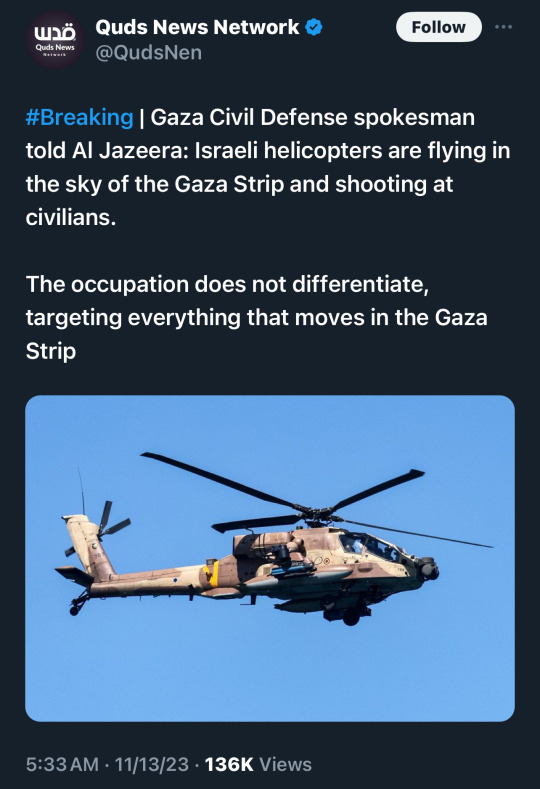
Source
Alt: “#Breaking | Gaza Civil Defense spokesman told Al Jazeera: Israeli helicopters are flying in the sky of the Gaza Strip and shooting at civilians. The occupation does not differentiate, targeting everything that moves in the Gaza Strip.”
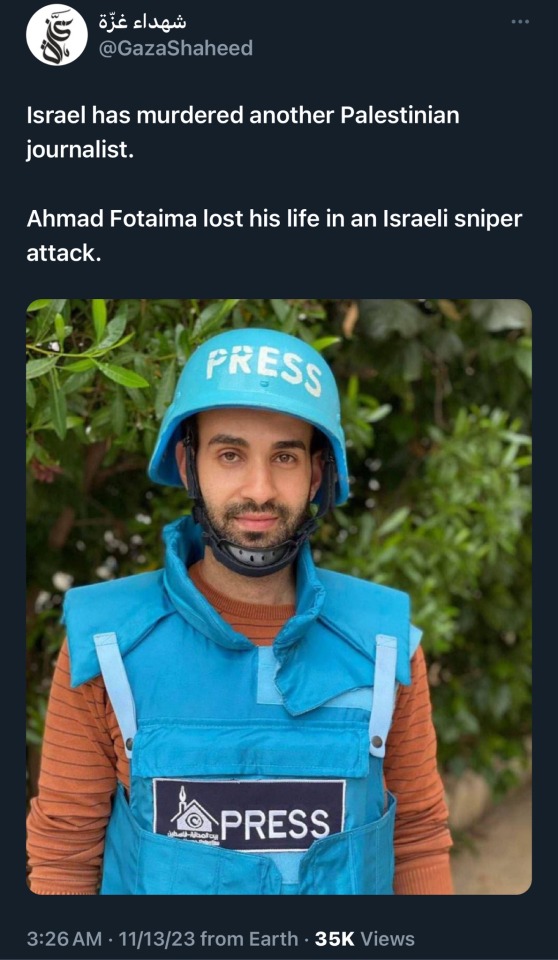
Source
Alt: “Israel has murdered another Palestinian journalist. Ahmad Fotaima lost his life in an Israeli sniper attack.”
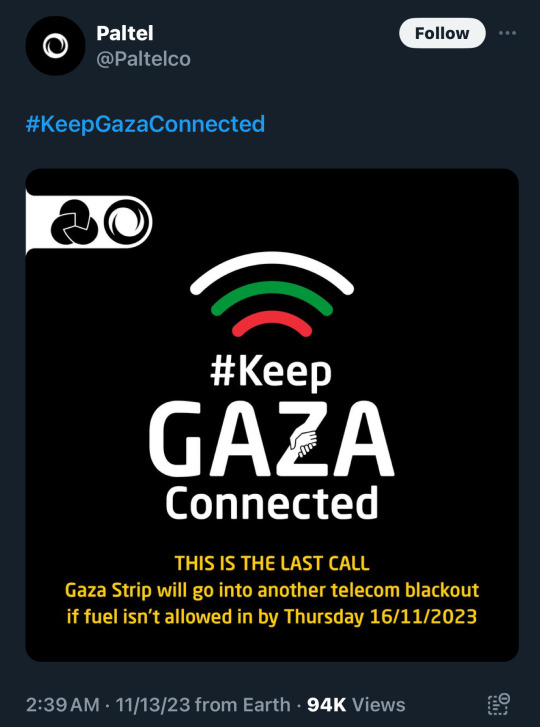
Source
Alt: “#Keep Gaza Connected. THIS IS THE LAST CALL. Gaza Strip will go into another telecom blackout if fuel isn’t allowed in by Thursday 16/11/2023.”
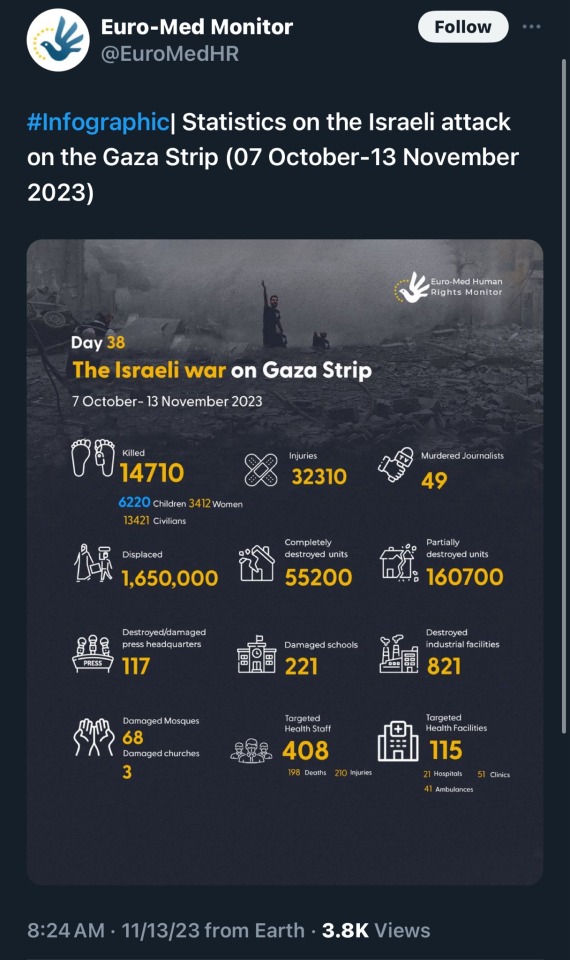
Source
Alt: “Day 38. The Israeli war on Gaza Strip. 7 October - 13 November 2023. Killed 14710. 6220 Children. 3412 Women. 13421 civilians. Injuries 32310. Marked journalists 49. Displaced 1,650,000. Completely destroyed units 55,200. Partially destroyed units 160,700. Destroyed/damaged press headquarters 117. Damaged schools 221. Destroyed Industrial Facilities 821. Damaged Mosques 68. Damaged churches 3. Targeted Health Staff 408. 198 Deaths. 210 Injuries. Targeted Health Facilities 115. 21 Hospitals. 51 Clinics. 41 Ambulances.
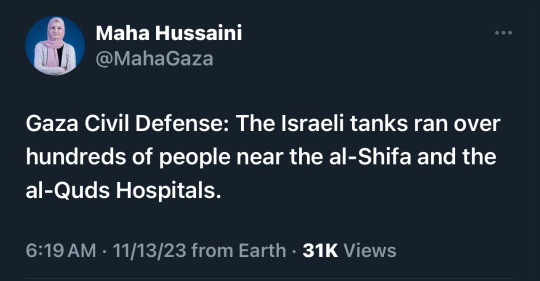
Source
Alt: “Gaza Civil Defense: The Israeli tanks ran over hundreds of people near the al-Shifa and the al-Quds hospital.”

Source
Alt: “The Israeli Army says raids continue in Gaza’s Shati refugee camp. The Israeli army says it continued its military raids in the Shati refugee camp, located on the outskirts of Gaza City. The military said it found Hamas infrastructures and weapons inside civilian buildings, including in al-Quds university and in a mosque. It also said that it raided the house of a senior member of the Palestinian Islamic Jihad armed group where it said it found other weapons. Al Jazeera could not independently verify these claims.”
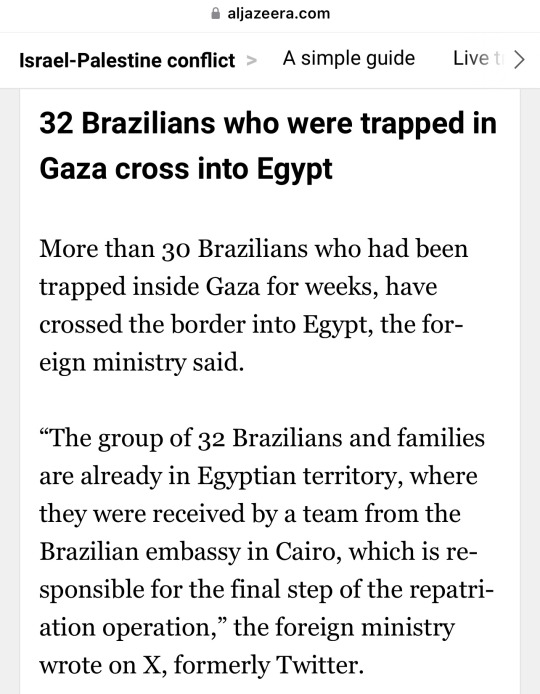
Source
Alt: “32 Brazilians who were trapped in Gaza cross into Egypt. More than 30 Brazilians who had been trapped inside Gaza for weeks, have crossed the border into Egypt, the foreign minister said. ‘The group of 32 Brazilians and families are already in Egyptian territory, where they were received by a team from the Brazilian embassy in Cairo, which is responsible for the final step of the repatriation operation,’ the foreign ministry wrote on X, formerly Twitter.”
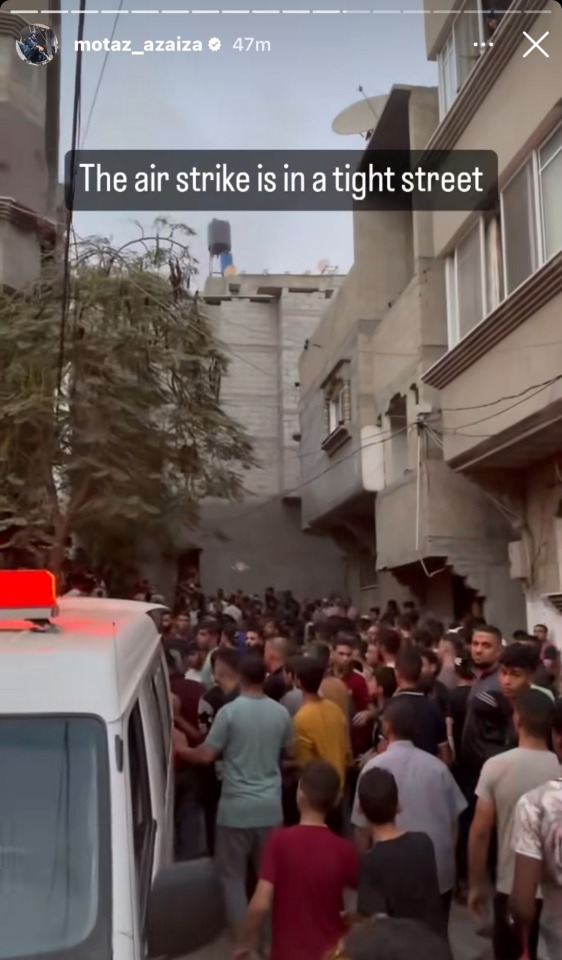
Video at Source
Alt: “The air strike is in a tight street.”
8 notes
·
View notes
Text
In short, regarding the situation:
....On July 18, 2023, following a trial rife with due process violations, an Egyptian emergency state security court handed down a three-year prison sentence to Patrick on trumped up charges of spreading false news. Patrick, who was a graduate student at the University of Bologna at the time, was arrested by Egyptian authorities on February 7, 2020, while at the Cairo Airport during a visit home to see his family. In custody, he was held incommunicado for a 24-hour period; he was beaten, stripped, electrocuted, verbally abused, and threatened. He was initially accused of joining a terrorist organization and spreading false news....
...lawyers learned that he had been referred to emergency state security court on false news charges for a 2019 article that he authored for independent digital media outlet Daraj on his experience as a Coptic Christian religious minority, titled, “Displacement, Killing, and Harassment: A Week in the Diaries of Egypt’s Copts.”
#cipher talk#Actually Egyptian tag#'Only a religious difference' if that was true and it isn't its still a damn big difference
6 notes
·
View notes
Text
The Ain Shams University archaeological team Unearth Limestone Cabin and Sphinx Statue in Egypt's Qena Governorate
@cairo-top-tours
https://zahwaabdelhamid.blogspot.com/2023/07/the-ain-shams-university-archaeological.html?m=1
5 notes
·
View notes
Photo

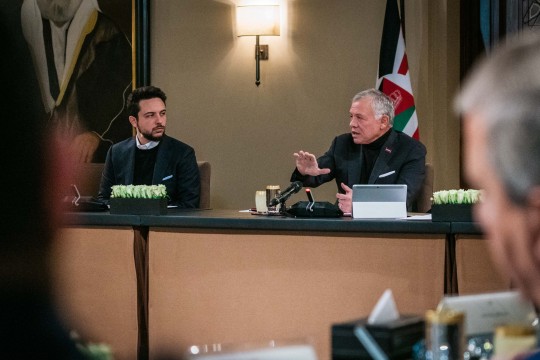
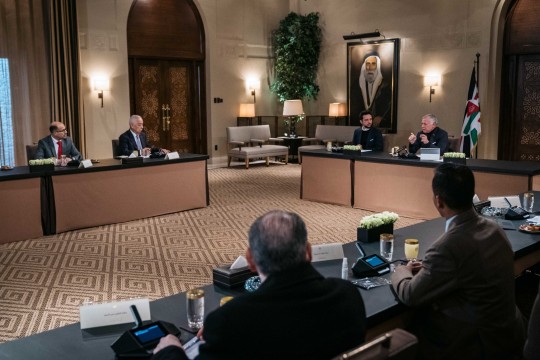

8 February 2023: King Abdullah II stressed that the Palestinian cause is at the core of Jordan’s diplomatic action, in order to mobilise support for the Palestinian people.
At a meeting with political science professors from Jordanian universities, King Abdullah said the latest diplomatic activity by Jordan was aimed at maintaining calm in the Palestinian Territories for the current period, in order to preserve chances to reach a political solution on the basis of the two-state solution.
His Majesty stressed the need to end unilateral measures and counter Israeli violations, while safeguarding Islamic and Christian holy sites in Jerusalem. (Source: Petra)
At the meeting, attended by Crown Prince Al Hussein bin Abdullah II, the King highlighted the outcomes of his recent visits to Cairo, Abu Dhabi, Doha, Ottawa, and Washington, DC.
His Majesty reaffirmed the importance of including Palestinians in regional economic projects, noting that the economic track is not an alternative to the political track.
The King also spoke about regional developments, expressing condolences over the victims of the earthquake that struck Syria and Türkiye and noting Jordan’s efforts to provide aid and assistance.
His Majesty stressed the need to support the Syrian people, as the devastation wrought by the earthquake further compounds the difficult conditions they are already facing difficult conditions.
The King also referred to Jordan’s efforts to promote regional cooperation through the trilateral framework with Egypt and Iraq, as well as through efforts to support Lebanon by working on electric connectivity projects.
The university professors commended His Majesty’s diplomatic efforts at the Arab and international levels, noting that Jordan is undertaking a key role in defending the Palestinian cause and promoting Arab integration and cooperation.
The political science professors gave comments and suggestions on foreign policy issues, adding that Arab countries should utilise the diplomatic tools at their disposal to safeguard their peoples’ interests.
6 notes
·
View notes
Text
Scientists Put a 2,000-Year-Old Mummy Through a CAT Scan and, Boy Oh Boy, That’s a Little Too Much Detail! Ancient Burial Practices Give New Meaning To The Term ‘Golden Boy’
— 25 January 2023 | Matthew Agius | Cosmos Magazine
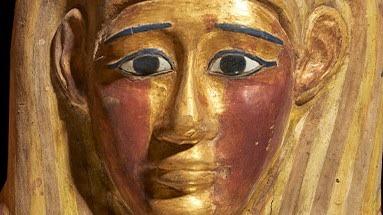
Golden Boy. Credit: Cairo University, Egypt
Meet Golden Boy: A wealthy Egyptian teenager who’s waited a very long time for his first CAT scan.
Over two millennia, in fact.
The cloth wrapped and embalmed mummy of the adolescent, encased in an elaborate sarcophagus, was fed into the scanner by Egyptian scientists curious to see what was within its burial container.
In doing so, the wooden coffin, first discovered more than a century ago in a cemetery south of Cairo, will remain closed, ensuring the child continues to rest easy.
Analysis of the scans found Golden Boy’s name is well deserved – his family were evidently high up in during Late Ptolemaic Egyptian society.
He was decorated with dozens of amulets – mostly gold – carefully arranged on top or within his body.
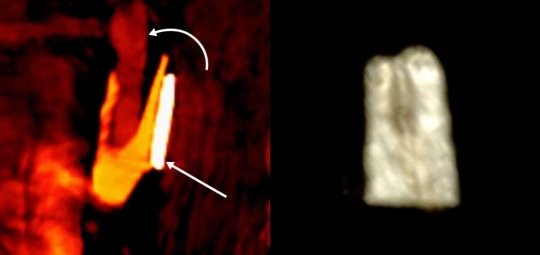
This is what a 2000-year-old phallus looks like. Credit: Egyptian Museum
A golden heart scarab amulet was placed within his chest cavity and a golden tongue within his mouth.
The detail of the scan even detected a two-finger amulet – exclusively given to the Egyptian dead – next to his uncircumcised penis.
Dr Sahar Saleem from Cario University who led the study says the mummy is an important example of burial rituals practised by the ancient Egyptians.
“This mummy’s body was extensively decorated with 49 amulets, beautifully stylised in a unique arrangement of three columns between the folds of the wrappings and inside the body cavity,” Saleem says.
“These include the Eye of Horus, the scarab, the akhet amulet of the horizon, the placenta, the Knot of Isis, and others. Many were made of gold, while some were made of semiprecious stones, fired clay, or faience.
“Their purpose was to protect the body and give it vitality in the afterlife.”
Golden Boy was, in real life, aged around 14-15, around 128cm and, according to the researchers, the possessor of an impressive dental record: no cavities, tooth loss or disease.
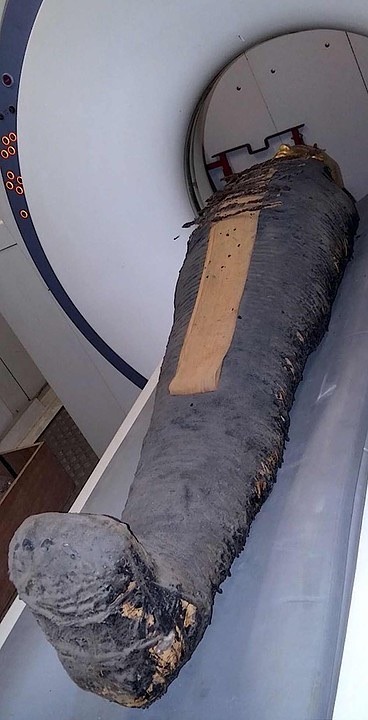
Golden Boy goes in for his scan. Credit: Egyptian Museum.
Aside from his evident wealth detected in the CT scan, he was also found wearing a golden head mask and white sandals, which Saleem says were “probably meant to enable the boy to walk out of the coffin”, upon entering the afterlife.
“Bouquets of plants and flowers were placed beside the deceased at the time of burial: this was done with the mummies of the New Kingdom kings Ahmose, Amenhotep I, and Ramesses the Great.”
While Golden Boy’s heart remained in place, most of his other internal organs were removed.
His heart was protected – as described in the Book of the Dead – by a scarab, which is intended to quell the Egyptian’s heart when it was judged. The researchers suggest this finding indicates ancient Egyptians valued their children and sought to protect them as they passed into the afterlife.
Despite spending two millennia in the Nag el–Hassaya cemetery, and the last century sleeping soundly in the museum’s basement, Golden Boy is now set for a noisier future as part of the main display upstairs.
3 notes
·
View notes
Text
📜𝙳𝙾𝙲𝚃𝙾𝚁 𝙽𝙸𝙻𝙰𝚈 𝙰𝚂𝙻𝙸𝙷𝙰𝙽 𝙱𝙰𝙸𝙻𝙴𝚈 𝚂𝚃𝙰𝚃𝙸𝚂𝚃𝙸𝙲𝚂📜





Trigger Warnings: Mentions of Bullying, Abuse, Abandonment, Placenta Previa, Attack, Pregnancy
📜𝙱𝙰𝚂𝙸𝙲 𝙸𝙽𝙵𝙾𝚁𝙼𝙰𝚃𝙸𝙾𝙽
FULL NAME: Nilay Aslihan (Aksoy) (Fahri nee) Bailey ; Ye'or, יאור
PRONUNCIATION: Nil-eye Az-lee-khan (Ahk-soy) (Fah-ri) Bay-lee ; Yee-oar
MEANING:
📜Nilay: Turkish, “Moon of the Nile”
📜Aslihan: Turkish, “From Khan family ; Noble”
📜Aksoy: Turkish, “Pure lineage”
📜Fahri: Turkish, “Honorary ; Titulary”
📜Bailey: British, “Berry clearing ; Bailiff ; City fortification”
📜Ye'or: Hebrew, “It Will Shine ; River Of Light ; The Nile ; Egypt” ; This name is associated with the Nile River in Egypt, which is a transliteration of the Egyptian word 'iotr, simply meaning watercourse (Genesis 41:1, Exodus 1:22, Isaiah 19:7).
REASONING: When Nilay had been found on the orphanage steps, there had been no information on her name or her birthday. The people at the orphanage named her Nilay Fahri, a name that’s rather fitting for her love of Egypt and her career. As for Ye’or, Richard and Jasmine helped chose her Hebrew name after she converted not too long after being adopted and feeling at home with the Baileys. Knowing that the name was associated with the Nile River and Egypt, they thought it was fitting considering her name being associated with the Nile River.
NICKNAME(S): Nile (by Elijah)
PREFERRED NAME(S): Nilay or Doctor Bailey
BIRTH DATE: August 3rd, 1989
AGE: Thirty-Four
ZODIAC: Leo
GENDER: Cis-Female
PRONOUNS: She/Her/Hers
ROMANTIC ORIENTATION: Demiromantic
SEXUAL ORIENTATION: Pansexual
NATIONALITY: British, Egyptian, Brazilian, and Turkish
ETHNICITY: Turkish
CURRENT LOCATION: Blue Harbor, Illinois, United States of America
LIVING CONDITIONS: Good, stable
TITLE(S): Doctor
📜𝙱𝙰𝙲𝙺𝙶𝚁𝙾𝚄𝙽𝙳
BIRTH PLACE: Mardin, Turkey (assumed)
HOMETOWN: Varied due to living around the world since being adopted by the Baileys: Primarily Cairo, Egypt and London, England, United Kingdom
SOCIAL CLASS: Upper Class/1%
EDUCATION LEVEL: Post-Graduate
FATHER: Richard Bailey (Adoptive) ; Adem Aksoy (Biological)
MOTHER: Jasmine Bailey (Adoptive) ; Ceren Aksoy (Biological)
SIBLING(S): Theo Bailey (Adoptive Older Brother) ; Evrim Aksoy (Biological Fraternal Twin) ; Safiye Aksoy (Biological Younger Sister)
BIRTH ORDER: Theo Bailey (35) ; Evrim Aksoy (34) ; Nilay Bailey (34) ; Safiye Aksoy (29)
CHILDREN: Hatshepsut Alexandria Bailey (7) ; Rhiannon Nurbanu Falvey (10 months old)
PET(S): Oliver (Gray tabby) ; Eve (Black bombay) ; Kemet (White and gray freckled cat ; Unknown breed)
OTHER IMPORTANT RELATIVES: Elijah Falvey (Nilay's Partner and Rhiannon's Father)
PREVIOUS RELATIONSHIPS: TBW/Short-Term Relationship for Five Months (is a WC)
ARRESTS?: None
PRISON TIME?: None
📜𝙲𝙰𝚁𝙴𝙴𝚁 & 𝙸𝙽𝙲𝙾𝙼𝙴
CAREER(S): Egyptologist, anthropologist, archaeologist, classicist, Assyriologist, author, content creator, and curator of the History of Egypt Wing and The Hall of Ancient Mediterranean Civilizations at Blue Harbor's Chambers Museum.
PRIMARY SOURCE OF INCOME: The Bailey Wealth
SECONDARY SOURCE(S) OF INCOME: Museum Wing Curator at Blue Harbor's Chambers Museum ; Content Creator on YouTube and Instagram ; Royalties from her books and documentaries she's hosted and participated in.
APPROXIMATE AMOUNT PER YEAR: The limit does not exist, she's rich-rich.
CONTENT WITH THEIR JOB (OR LACK THEREOF)?: She’s in love with her careers, but would love to do more as well.
PAST JOB(S):
📜Blue Harbor, Illinois, USA: Professor at Blue Harbor University (September 2020-May 2023)
📜Cairo, Egypt: Conservator at Egyptian Museum (December 2010-May 2014)
📜Cairo, Egypt: Tour Guide at Egyptian Museum (July 2008-December 2010)
📜Cairo, Egypt: Gift Shop Attendant at Egyptian Museum (September 2004-July 2008)
SPENDING HABITS: Claims to be good at saving money, but that is a massive lie. Always buying something for Eli and their girls, for the furbabies, and buying books, plants, or items for the house, whether decor or renovation items.
MOST VALUABLE POSSESSION: Her family, if we’re going literal. Trinket-wise: A locket consisting of pictures of her, Eli, Alex, and Rhia; a necklace with a gold Rhiannon pendant from Awe Inspired in honour of Rhia that was given to her by Elijah to match the same pendant he has; her vintage, Sephardi-inspired golden and sapphire Magen David she’d gotten for her Bat Mitzvah; and any of her Awe Inspired Egyptian and Lilith jewelry collection.
📜𝚂𝙺𝙸𝙻𝙻𝚂 & 𝙰𝙱𝙸𝙻𝙸𝚃𝙸𝙴𝚂
PHYSICAL STRENGTH: Above Average
OFFENSE: Above Average
DEFENSE: Above Average
SPEED: High
INTELLIGENCE: Extremely High
ACCURACY: High
AGILITY: High
STAMINA: High
TEAMWORK: High
TALENTS: Polymath, able to store extreme amount of information; Polylingual, knows seventy languages; Athletic; Artistic, can sing, play three instruments, and has some light drawing and painting skills; Detail-oriented, whether for the museum concerning her wings or for her own home; Empathetic and emotionally intuitive; Knows how to ride a horse; Knows how to fence, shoot an arrow, and how to shoot a handgun; Knows how to fight.
SHORTCOMINGS: She’s been struggling with her memory slightly since her attack back in summer 2021, still able to remember things she learned and experience beforehand, but sometimes struggles to retain some information since then; Her health has been unbalanced since her first pregnancy with Alex, making it easier for her to become extremely sick; Has the potential to have placenta previa again for any future pregnancies after Alex and Rhia.
LANGUAGE(S) SPOKEN: Sixty spoken languages, primarily Turkish, Hebrew, Arabic (all dialects), English, Ladino, Armenian, Syriac, Kurdish, Yiddish, and Brazilian Portuguese. Knows around ten dead languages, such as Coptic, Latin, Koine Greek, Pontic Greek, Aramaic, and a couple of others.
DRIVE?: Yes.
JUMP-STAR A CAR?: Yes.
CHANGE A FLAT TIRE?: Yes.
RIDE A BICYCLE?: No.
SWIM?: Yes.
PLAY AN INSTRUMENT?: Piano, harp, and oud; Wants to learn more Mediterranean instruments, both ancient and modern.
PLAY CHESS?: Yes.
BRAID HAIR?: Standard braid, French braid, and fishtail braid primarily. Working on learning more.
TIE A TIE?: Yes.
PICK A LOCK?: Yes.
📜𝙿𝙷𝚈𝚂𝙸𝙲𝙰𝙻 𝙰𝙿𝙿𝙴𝙰𝚁𝙰𝙽𝙲𝙴 & 𝙲𝙷𝙰𝚁𝙰𝙲𝚃𝙴𝚁𝙸𝚂𝚃𝙸𝙲𝚂
FACE CLAIM: Hande Erçel
EYE COLOR: Dark brown
HAIR COLOR: Dark brown/Soft reddish-black (Hande’s hair colour in Halka)
HAIR TYPE/STYLE: Curly (Hande’s curly hair in the beginning of season two for Sen Çal Kapımı)
GLASSES/CONTACTS?: Reading glasses
DOMINANT HAND: Ambidextrous
HEIGHT: 5’0”
BUILD: Slender and athletic
EXERCISE HABITS: Has been taking Krav Maga and self-defense classes since late 2021. Does yoga, running, hiking, swimming, horseback riding, kayaking and canoeing, archery, HIIT, dancing, and pilates.
SKIN TONE: Light Olive/Beige with Olive and warm undertones, can become extremely tan in the summer.
TATTOOS: Twelve, more to come
📜When Nilay was 19, she got a tattoo of her Hebrew name: Ye'or, יאור. It means “It Will Shine/The Light of the River/The Nile” and is located on the back of her neck.
📜She has a small Ancient Egyptian-inspired Lotus outline tattoo on her lower back. The Lotus flower is regarded in many different cultures, especially in eastern religions, as a symbol of purity, enlightenment, self-regeneration and rebirth. Its characteristics are a perfect analogy for the human condition: even when its roots are in the dirtiest waters, the Lotus produces the most beautiful flower. She got this when she was 20 in Egypt.
📜While in Turkey a few weeks after leaving Egypt during summer break, she got both an Evil Eye and Hand of Hamsa tattoo on her right inner arm above her elbow. The Evil Eye is meant for protection, as well as the Hand of Hamsa. Nilay had gotten this as a way to connect with and honour her Turkish roots while also tying in her Jewish upbringing and culture, along with her Egyptian culture.
📜On her right side, she has the cartouche of Pharaoh Hatshepsut tattooed on her. In honour of her favourite historical figure.
📜On her right thigh, she has a tattoo of an Egyptian Cypress tree with pearls on the branches. Underneath it is Shajar al-Durr’s name in Arabic. Shajar al-Durr became the sultana of Egypt on May 2nd, 1250 and ended the Ayyubid reign and started the Mamluk reign. Her name means “tree of pearls” in Arabic.
📜On her left thigh, she has an outline of the Atik Valide Mosque tattooed there. The complex was one of the many accomplishments of Nurbanu Sultan, the Haseki Sultan of Sultan Selim the Second, her legal husband, and Valide Sultan of Sultan Murad the Third, her son.
📜Nurbanu is another one of Nilay’s favourite historical figures, alongside Hatshepsut, Shlomtzion/Salome Alexandra, and Shajar al-Durr, so it made sense to her to have a tattoo in honour of Nurbanu.
📜She’d gotten those three tattoos when she was 21.
📜Before she left for Egypt, she got a small blank Polaroid picture tattooed on her left side. A few months after Hattie was born, she got a tattoo of an Egyptian lotus in the blank picture with Hattie’s birthday in Roman numerals written underneath.
📜Right next to her tattoo dedicated to Hattie, she has a dove tattoo featuring a mama dove and two baby doves sitting on an olive branch, dedicated to her girls.
📜Along with those two tattoos dedicated to her daughters, she had gotten another set dedicated to them: both of their initials (HAB and RNF) tatted on her right wrist.
📜She got both of those tattoos when she was 33, a couple of weeks before her 34th birthday in 2023.
📜After the premiere of her first docuseries that she hosted, she got her eleventh tattoo in honour of the next step in her career: the Egyptian goddess, Aset/Isis, located on her chest beneath her breast, like Rihanna’s.
📜She’s recently received a small rainbow next to her Polaroid with the lotus and the mama & baby doves duo, in honour of Rhiannon.
PIERCINGS: Standard lobe piercings (both), upper lobe piercings (both), auricle piercings (both), helix piercing (left), stomach piercing, and nipple piercings. Debating on getting a Medusa piercing.
MARKS/SCARS:
📜Has a couple of minor scars from playing around a lot as a child.
📜Has some minor burn scars on the palms of her hands, knees, and shins from when a group of her bullies stuffed her in a metal dog kennel during a hot day in Cairo, causing the kennel to become overheated and the metal to leave some thin one-inch burn scars.
📜Her most prominent scars are on her stomach. She has a scar that’s become light now on her lower abdomen from her Cesarean-section to deliver Hattie, though it was reopened for her C-section op with Rhia.
📜She also has around five, scattered one inch scars in various places on her stomach, due to her attack back in July 2021 and being stabbed multiple times.
NOTABLE FEATURES: Her big brown eyes, her short height, her smile, her nose.
USUAL EXPRESSION: Either a soft smile on her face or furrowed brows while deep in thought.
CLOTHING STYLE: Varies on her mood, activities, and the season. Typically bohemian/global-inspired and items from global brands, adventurer, vintage, artsy, casual, comfy athletic, dark and light academic, but can also glam it up for the occasion.
JEWELRY: Is a major necklace and ring girl. Prefers gold jewelry. Loves to layer her necklaces and can typically be seen wearing her locket, her Rhiannon pendant, a gold and sapphire Magen David, and a gold Chai (“life),חי.
ALLERGIES: None.
DIET: None, will eat anything.
PHYSICAL AILMENTS: Placenta previa and migraines.
📜𝙿𝚂𝚈𝙲𝙷𝙾𝙻𝙾𝙶𝚈
JUNG TYPE: Extraverted Thinking - Principled, idealistic, objective, rational.
JUNG SUBTYPE: Introverted Feeling - Sympathetic, pleases others, may be dependent, reserved.
ENNEAGRAM TYPE: ENFJ - The Teacher
MORAL ALIGNMENT: Lawful Good
TEMPERAMENT: Sanguine
ELEMENT: Air
PRIMARY INTELLIGENCE TYPE: Existential, Logical, Naturalist, Interpersonal, and Linguistic primarily, but she connects with all of them (Kinesthetic, Spatial, Musical, and Intra-Personal).
APPROXIMATE IQ: 200
MENTAL CONDITIONS/DISORDERS: Depression, anxiety, PTSD, and night terrors.
SOCIABILITY: Pretty sociable, but needs moments away from too many people.
EMOTIONAL STABILITY: Typically level headed, though feels passionately and can be prone to anxiety.
OBSESSION(S): Learning and gaining more knowledge and wisdom.
COMPULSION(S): Learning everything and anything. Getting so lost into her work to the point of forgetting to take care of herself yet always remembering to take care of others. Suffers from the delusional “How hard can it be?” syndrome when it comes to DIY-ing and renovating her home, and being bad at asking Eli for help or accepting his help. Buying way too many plants and things for the house. Always wanting to adopt every single animal she sees, including the wild animals. Would adopt a rabbit if Eli wasn’t against it.
PHOBIA(S): Arachnophobia and acrophobia. Has a fear of dog kennels. Fear of not being enough and being others', especially the people she loves, second choice. Is afraid of losing her memories completely one day.
ADDICTION(S): Can one be addicted to learning?
DRUG USE: Minor marijuana use occasionally, typically through gummies. Occasionally smokes shisha.
ALCOHOL USE: Once in a while, is more of a social drinker.
PRONE TO VIOLENCE?: No, has only intentionally been violent once in an attempt to defend herself during her attack.
📜𝙼𝙰𝙽𝙽𝙴𝚁𝙸𝚂𝙼𝚂
SPEECH STYLE: Formal and intimate, medium tone.
ACCENT: Primarily Egyptian with a light southern Turkish accent. Her voice is inspired by Egyptian actress, Yasmine Sabri, and Hande Ercel's.
HOBBIES: Spending time with her family, spending time with her friends, practicing her Judaism, staying active in the community, horseback riding, learning anything and everything, learning a new language, reading, doing research for her projects, dancing, exercising, filming for either her YouTube/Instagram content or for documentaries she participates in or hosts, decorating her and Eli's house whenever inspiration strikes, historical reenactments, ghost hunting, cleaning tombstones at the local cemetery, visiting the old graves with flowers, and researching the residents at the cemetery so that their memories and stories could live on.
HABITS AND QUIRKS: Keeping her thoughts to herself, sometimes struggles to stand up to herself but has gotten better about that, and avoiding those she believes dislikes her. Tends to play with one of her necklaces when deep in thought or is anxious. When passionate, she can become quite a rambler, going on a tangent without remembering to take a breath until she done. During her rambles, rants, and tangents, she also tends to speak with her hands (or, well, speaks with her hands in general; she's Turkish, Egyptian, and Jewish, what do you want from her?). Is very shy and polite when you first meet her, but once you get to know her? Loud, absolutely loud and energetic. She is not yelling, she is simply talking. (Again, she's Mediterranean; old habits die hard.)
NERVOUS TICKS: Playing with her Magen David.
DRIVES/MOTIVATIONS: Her family being happy and getting to accomplish all of her career goals.
FEARS: Losing her family, not being enough, being in a coma again and losing large tracks of time, losing all of her memories entirely, heights, spiders, dog kennels, and her attacker coming back.
POSITIVE TRAITS: Intelligent, motherly, compassionate, kind, passionate, artistic
NEGATIVE TRAITS: Insecure, fearful, self-conscious
SENSE OF HUMOR: Depends on who she's with; She could be reserved and gentle or playful and an absolute menace.
DO THEY CURSE OFTEN?: Sometimes, depending on who she’s with.
CATCHPHRASE(S): *rambles about ancient history, particularly Ancient Egypt*
📜𝙵𝙰𝚅𝙾𝚄𝚁𝙸𝚃𝙴𝚂
ACTIVITY: Spending time with Eli and the kids, learning about history and other cultures, going to synagogue and practicing her Judaism
ANIMAL: Cats, owls (sorry, Eli!), snakes, and horses
BEVERAGE: Tea, primarily chai or Turkish tea
BOOK: Chasing Chariots: Proceedings of the First International Chariot Conference by Dr. Andre J. Veldmeijer (Editor) and Prof. Dr. Salima Ikram (Editor) ; Lore by Alexandra Bracken ; Eureka, Ariadne, Atalanta, and Hera by Jennifer Saint ; Lilith by Nikki Marmery ; Secrets of the River duology (What The River Knows and Where The Library Hides) by Isabel Ibañez
CELEBRITY: Elijah Falvey, her parents, Doctor Salima Ikram
COLOR: Egyptian blue, gold, amethyst purple, bohemian black, pearl white, blush pink, teal, emerald green, and sage green
DESIGNER/BRANDS: Awe Inspired Jewelry, Common Era Jewelry, Olithica Jewelry, MARCOZO Jewelry, Rebus Signet Rings, Catori Life Jewelry, Caesar Archivum Jewelry, Cleopatra’s Bling Jewelry, Thistle and Spire, Inkkas Shoes, Ethnotek Bags, Pure World Bags, Wondery, Peruvian Connection, REI, Aventura, Patagonia, BANGS Shoes, Firm Abs, Toms Shoes, Nike
BEAUTY BRANDS: Tesori D’Oriente (body, primarily their Egypt collection), Joon (hair), Amika (hair), Fable and Mane (hair), Viori (hair), Eternal Muse (hair), Saphira Hair (hair), Saltair (hair and body), The Mane Choice (hair and body, primarily their Ancient Egyptian collection), Blue Lagoon Skincare (hair and skincare), Global Beauty Secrets (hair, body, and skin), AHAVA (hair, body, and skin), Rituals Cosmetics (hair, body, skin, and beauty), Korres (hair, body, skin, and beauty), FieldTrip (skincare), Ra Egyptian (skincare), Whind (skincare), Aavrani (skincare), Khalm Skincare (skincare), Kosterina (skincare), Mount Lai (skincare and beauty tools), Hathor Organics (hair, body, skin, self-care, beauty, and misc), Nefertari (hair, body, skin, self-care, beauty, and misc), Juvia’s Place (makeup), Zeesea (makeup, primarily their British Museum: Egypt collection)
FOOD: Chicken potstickers, General Tso's Chicken, and Jasmine Rice
FLOWER: Lotus, Damask roses, daisies, orchids
GEM: Pearls, peridot, emeralds, moonstones, rose quartz, lapis lazuli, rubies, gold
HOLIDAY: Rosh HaShanah, Yom Kippur, and Shabbat
MODE OF TRANSPORTATION: Her Jeep
MOVIE: The Mummy by Stephen Sommers ; The Mummy Returns by Stephen Sommers ; The Prince of Egypt by Brenda Chapman, Steve Hickner, and Simon Wells ; As Above, So Below by John Erick Dowdle
MUSICAL ARTIST: Amethyst (primarily Elijah Falvey), Ofra Haza, Lord Huron, Stevie Nicks, Fleetwood Mac, The Lumineers, Hadise, Helena Paparizou, Noa Kirel, Brunette, Sirusho, lots of Eurovision contestants/music, Yasmin Levy, Sarah Aroeste, Alabina (Ishtar and Los Niños de Sara), Light in Babylon, Eleni Foureira, Evangelia, Mor Karbasi, La Zarra, Hiba Tawaji, Nutsa Buzaladze, LADANIVA, Slimane
QUOTE/SAYING: “History has its eyes on you.” - Hamilton
SCENERY: The Nile River with a view of either the Giza Pyramids or the temples in Luxor or Aswan, the Kotel/Western Wall/Wailing Wall, the Mediterranean Sea, or the Red Sea
SCENT: Eli’s shampoo, body wash, and body spray; milk and honey; Damask rose; pomegranate; pistachio; saffron; argan oil; oud; vanilla; cinnamon; mint; lavender; orange; orange blossom; eucalyptus
SPORT: Futbol
SPORTS TEAM: Brazil’s national futbol team
TELEVISION SHOW: Muhteşem Yüzyıl (Magnificent Century) ; Muhteşem Yüzyıl: Kösem (Magnificent Century: Kösem) ; Netflix’s The Club ; Netflix’s The Beauty Queen of Jerusalem ; Amazon Prime’s The Marvelous Mrs. Maisel ; Shahid’s The Grand Hotel: Secrets of the Nile
WEATHER: Sunny, warm, light breeze
VACATION DESTINATION: Egypt, Greece, Turkey ; Mediterranean region
📜𝙰𝚃𝚃𝙸𝚃𝚄𝙳𝙴
GREATEST DREAM: To be happy with her family, make more history-changing discoveries, expand her career more, and write more books.
GREATEST FEAR: To lose her family, to go into another coma and lose a large track of time, to not be enough.
MOST AT EASE WHEN: In organized chaos and doing something.
LEAST AT EASE WHEN: Standing still and doing nothing.
WORST POSSIBLE THING THAT COULD HAPPEN: Losing her family completely.
BIGGEST ACHIEVEMENT: Her children.
BIGGEST REGRET: Not telling Elijah about her feelings sooner and ending up leading on someone she cared up, and ending up hurting them in the end.
MOST EMBARRASSING MOMENT: Having her first time involving her first kiss and sex being a drunken one night stand with a man she never met, doesn't remember what he looks like, yet also doesn't regret it because it led to her having Hattie. So, a massive win, in the end.
BIGGEST SECRET: She doesn't fully feel alive. After her multiple brushes with death, Nilay has often had moments where she couldn't know for certain if she was alive or not. She doesn't talk about it with anyone because she doesn't want to scare her loved ones that she oftentimes feel more like a ghost than a living being.
TOP PRIORITIES: Her family and loved ones, her Judaism, her careers.
#( facts & tidbits. 𓂀 )#tw: bullying#tw: abuse#tw: abandonment#tw: placenta previa#tw: attack#tw: pregnancy#bullying tw#abuse tw#abandonment tw#placenta previa tw#attack tw#pregnancy tw
0 notes
Text
Cairo University Faculty of Medicine
#cairo university#cairo university faculty of medicine#cairo university egypt#ain shams university#mbbs in egypt#cairo university campus tour#cairo university campus#faculty of medicine cairo university#study mbbs in egypt#cairo university tour#cairo university vlog#visiting to cairo university#cairo university egypt 2023#cairo medical university#mbbs in cairo university#cairo university in 4k#cairo university in giza#ain shams university egypt#bestmbbsconsultants#bashkir state medical university#mbbsrussia#kazan#kazanfederaluniversity#russia#edurizon#kazanfederal#youtube#mbbsinrussia
0 notes
Text
CHARLOTTE CARDIN RELEASES NEW SINGLE “LONELY WITH OUR LOVE” AND ANNOUNCES A WEEK IN NASHVILLE EP DROPPING ON MAY 17

Award-winning Canadian singer-songwriter Charlotte Cardin announces her newest EP, A Week in Nashville, to be released this Friday, May 17th via Cult Nation. Her new song “Lonely with Our Love” is out now.
A piano-focused track, “Lonely with Our Love” is a somber ballad about a crumbling relationship. Cardin’s powerful vocals are at the forefront of the track as she asks her partner, “Are we even happy anymore?” The single’s reflective nature captures the tone for the rest of the EP, showing her stepping into the personal lyricism that has captivated millions of fans worldwide.
“Loneliness is such a universal feeling, but there's a distinct kind that comes with being with someone. And that's the heart of "Lonely with Our Love,’” shares Charlotte. “I wrote this song with the extremely talented Gabe Simon, and it was one of those rare, magical sessions where the song just unfolded on its own. We wanted to capture that complex, paradoxical feeling of being alone together.”
The single and upcoming EP follow on the heels of Cardin’s 4-track EP released in November 2023, Une Semaine à Paris. Just a few months prior, she released her sophomore album, 99 Nights, which gained praise from outlets including Billboard, NYLON, Complex, and more and won the 2024 JUNO awards for ‘Pop Album of the Year” and “Album of the Year.” Looking ahead, next month Cardin will embark on what is set to be an expansive international run of shows, including multiple dates in France and Québec, as well as stops in Luxembourg, Belgium, and Switzerland. Fans can purchase tickets HERE, and a full list of dates can be found below.
Charlotte Cardin Tour Dates
June 6 - Argelés, France - Bacchus Festival
June 8 - Amiens, France - Minuit Avant La Nuit
June 9 - Luxembourg, Luxembourg - Francofolies Esch/Alzette
June 10 - Liege, Belgium - OM
June 13 - Neuchatel, Switzerland - Festi’Neuch
June 21 - Milwaukee, WI - Summerfest
June 28 - Marmande, France - Garorock
June 29 - Bobital, France - Festival Bobital L’Armor À Sons
June 30 - Paris, France - Solidays
July 4 - Trois-Rivières, Québec - Festivoix
July 5 - Cowansville, Québec - Soif De Musique
July 6 - Baie Commeau, Québec - Festival Eau Grand Air
July 10 - La Rochelle, France - Les Francofolies de la Rochelle
July 12 - Neuve-Eglise, France - Decibulles
July 13 - Aix-Les-Bains, France - Musilac
July 14 - Carhaix, France - Festival Des Vielles Charrues
July 20 - Saint Nazaire, France - Les Escales
July 21 - Spa, Belgium - Les Francofolies de Spa
July 14 - Jullouville, France - Les Grandes Marees
July 26 - Cognac, France - La Fete du Cognac
August 16 - Saint-Jean-Sur-Richelieu, Québec - L’International de Montgolfières
August 25 - Vancouver, Québec - Pacific National Exhibition
August 29 - Gatineau, Québec - Festival de Montgolfières de Gatineau
November 16 - Cairo, Egypt - Cairo Jazz Club
November 21 - Istanbul, Turkey - Volkswagen Arena
November 22 - Ankara, Turkey - Jolly Joker
November 26 - Caen, France - Zénith
November 27 - Dijon, France - Zénith
November 30 - Lille, France - Zénith
December 2 - Brussels, Belgium - Cirque Royale
December 3 - Nantes, France - Zénith
December 4 - Lyon, France - Radiant-Bellevue
December 5 - Paris, France - Paris-Zénith
#charlotte cardin#a week in nasshville#nashville#montreal#montreal artist#montreal singer#montreal singer-songwriter#montreal singers#montreal singer-songwriters#lonely with our love#singer#singer songwriter#r&b#r&b artist#r&b music#r&b/soul#r&b singer#spotify#youtube#music#artist#musician#soundcloud#culture#art#canadian artist#canadian music#canadian#canada#Spotify
1 note
·
View note
Text
-Issue 11 | October 24, 2023
How should we situate the present dynamics in Palestine within the broader context of the region?...
...
Every ignorant pundit with no sense of history who talked about how unimportant the Palestine issue was to ordinary Arabs or to the Arab countries should never open their mouth again. Because what we have seen is demonstrations in Egypt, Jordan, Turkey, Lebanon, Morocco, Bahrain. Some of these are jackboot dictatorships, where nobody’s allowed to demonstrate. Nobody’s allowed to express themselves. And yet, public opinion across the Arab world has erupted in support of Palestinians. There have been monumental demonstrations. Yemen is a country devastated, a failed state. They have a civil war, they’ve been bombed by the Saudis and the Emiratis for years and years, and they’re out in the streets demonstrating for Palestine.
I’ve found some four hundred newspaper articles published before 1914 in a dozen Arabic newspapers, from Cairo to Damascus to Aleppo, talking about Palestine and Zionism. People in the Arab World were concerned about this 110 years ago. They were concerned about this during the Arab Revolt of ’36-’39, and they were concerned about this during the Nakba, and they’ve been concerned about it ever since. Have Arab governments represented that concern? Rarely. Never. Sometimes. But that’s not the point. These are undemocratic regimes — absolute monarchies or jackboot dictatorships, and they represent nobody and nothing except their own kleptocracies, the people who are being enriched by them, and the foreigners who keep them in power with weapons or diplomatic support.
This is not just the Arab world, or even the Muslim world. The Americans, the Europeans, the white settler colonial bubble, which produces a very large share of world GDP, and which has enormous media reach, enormous power — aircraft carriers, stock exchanges, media conglomerates — still think of themselves as the masters of the universe. They’re a tiny minority of the world’s population. India, China, Indonesia, Pakistan, Bangladesh, Brazil: those are some of the world’s largest countries, and people there don’t have the same view of this at all. Here we have a sanitized worldview produced by a compliant corrupt media and the American and British governments, which have decided that support of Israel is a national interest. And then you have the world — the real world — which is on a completely different page. This deepens the gulf between the West and the rest. I think the Ukraine War started this. In most of the world, nobody looks at the Ukraine War the way that the United States and its European allies do, which is visible in the way the General Assembly has reacted to it. It’s not that people are supportive of Russia, necessarily; it’s that they don’t see it in the same hysterical, hyperbolic fashion as the United States and its closest allies and — perfectly understandably — Ukrainians and Eastern Europeans do. What’s happening now in Palestine is accentuating that, and is going to diminish the power and the standing and security of the United States and its allies. Americans who talk about human rights and democracy are going to be treated as the most rank, nauseating hypocrites going forward. Nobody believes that rhetoric in the rest of the world, with good reason.
The word “occupation” does not exist in the American lexicon where Israel is concerned. The occupation is not an “obstacle to peace” — it’s an aggressive, violent imposition, which is designed to turn Palestine into the land of Israel, as Zionist leaders have been trying to do since Theodor Herzl. So when the United States bleats about the occupation of Ukraine, and then links Hamas and Putin, as Biden attempted to do in his Oval Office address, nobody buys this stuff, except people in the Anglosphere who are either ignorant or brainwashed. But a CBS poll showed that a majority of Democrats and independents oppose military aid to Israel; most Americans are a lot more sensible than those who govern us.
#palestine#free palestine#gaza#isreal#genocide#apartheid#colonization#american imperialism#us politics#police state#settler colonialism#settler violence
1 note
·
View note
Text
International Women’s Day is March 8
March 8 is International Women’s Day. On International Women’s Day, we celebrate the social, economic, cultural, and political achievements of women globally. International Women’s Day reminds us to address gender inequalities and advocate for women’s rights.
This year, we highlight the important work of three students from the UMass Boston School for Global Inclusion and Social Development who are working to promote a more inclusive and equitable world for women and people of all genders around the world.
The following blog posts were written by Shymaa Bedaiwy Allam, Odgerel Dashzeveg, Shahrzad Sajadi, and Joy Chrysyl L. Solon.
“A Women, Helping Women Help Women”: Women’s Financial Inclusion in Egypt
By: Shymaa Bedaiwy Allam

Shymaa speaking at a financial empowerment for women and youth session at the Arab Savings and Financial Literacy Conference in Cairo, October 2023.
I focus my research on the impact of financial inclusion and microfinance on women’s empowerment. Microfinance came into the spotlight worldwide as one of the most debated development tools right after Muhammed Yunus was awarded the Nobel Peace Prize in 2006. Most of the debate around microfinance focuses on the impact of extending these financial services to people who experience poverty and whether microfinance services have helped people out of poverty.
My research highlights the uniqueness of microfinance staffing and the critical role microfinance staff play in extending microfinance services to those who experience poverty. I seek to answer questions like, what is the impact of loan officers on microfinance's mission? With microfinance being first introduced to women, it is meaningful to focus on the role of women loan officers on helping their women clients. Women loan officers also must navigate the assumption that women are better lenders than men. I also address the impact of microfinance regulations on empowering women in Egypt. I aim to map the challenges and opportunities for women within the microfinance market to prevent over-indebtedness and other potential harm to women entrepreneurs.
I was the first woman microfinance regulator in Egypt. I have previously worked as the financial inclusion programme manager with UN Women, and as a policy development specialist at a US Agency for International Development (USAID)-funded activity on Micro-Enterprise Finance (EMF). I have also coordinated many of Sanabel’s regional projects (the Microfinance Network for Arab countries). I am now pursuing Doctorate studies at the University of Massachusetts Boston in the field of Global Inclusion and Social Development.
I hope to continue working as an expert in poverty alleviation issues for women. I want to continue analyzing the impact of economic policies on the welfare of women. I wish to do this as a university staff member, so that I also have the opportunity to teach the next generation. In my words, I am “a woman, helping women help women.”
Contact Shymaa by email for more information about her work: [email protected]
Celebration of International Women’s Day in Mongolia
By: Oge Dashzeveg

Traditional Naadam festival celebrated July 11–13, 2022 in Mongolia, Photo Credit: Odgerel Dashzeveg
Mongolia is one of the many countries that celebrate International Women's Day on March 8 as an official public holiday. This tradition dates back to the socialist era when women's suffrage as working mothers was celebrated and rewarded. Socialism promoted working mothers through education, work, and care. In return, women were committed to contributing to the communist production of the economy equally to men and the reproduction of the workforce within their full ability as mothers. This holiday is celebrated as Mother's Day in both public and private spheres.
In post-socialist Mongolia, this public holiday still holds the legacy of Mother's Day but is celebrated more as a Women's Day. Since transitioning from a planned economy communist system to a democratized market capitalism, the contact between the state and women has changed. The state still provides limited care for women, but education and work shifted to the invisible hands of market regulation. The state continues to celebrate women's motherhood by holding mass public events and awarding women who have given birth to four or more children.
On the flip side, women are fighting for their de-facto rights, urging the state to understand the reality women have been dealing with since the transition. The unintended consequences of failing economies have trapped many women in extended unemployment, underemployment, and poverty. This exacerbates their socioeconomic vulnerability, making them more susceptible to social and domestic abuse and discrimination.
Today, the younger generation of women is becoming the voice for all, advocating for generational gender equality in politics, inclusive access to economic opportunities, reducing the motherhood penalty, and promoting welfare mothers' transition to decent and flexible work.
Contact Oge by email for more information about her work: [email protected]
Memoir Writing Workshops with Syrian Refugee Women and Girls
By: Shahrzad Sajadi

Laundry on lines outside the informal settlement camps in the Bekaa Valley of Lebanon, Photo credit: Naoki Tokyo.
After conducting a series of workshops with Syrian refugee youth and needs assessment studies with other experts in the field around the rise in the rates of child marriages in the region, my colleague Dr. Valerie Karr and I ran a series of empathy-focused memoir writing workshops with seven Syrian refugee women and girls in the Bekaa Valley of Lebanon. The stories that emerged from these workshops tell the tale of loss and pain as well as empowerment and tremendous strength. These workshops were facilitated by our local partner, Nahida Nusair who met with the women on a weekly basis and kept in contact with them even after the workshops were over.
Here is an excerpt from one of the stories of the young women:
I am one of the women who decided their fate with their own hands. I decided to be one of the married young girls. I thought marriage was a white dress, pretty jewelry, a big party, dancing, and singing. And I thought that every day would be better than the one before. And I used to think that my husband would love me so much and would take care of me and give me everything I asked for, whatever I wanted would be ready in front of me and that he would take me every day to a place, and we would be very happy. Do you think this is what marriage is? I did."
Contact Shahrzad by email for more information about her work:
The Impact of Typhoon Yolanda and Climate Change on Women in Philippines
By: Joy Chrysyl Llido Solon

Joy Solon with a view of San Miguel de Allende, Mexico in the background.
The changing climate has caused an increase in extreme natural disasters. Typhoon Yolanda, one of the most destructive typhoons ever, made landfall through central and southern Philippines on November 8, 2013. Over 150,000 families were evacuated, and 6,300 lives were lost[1]. As a PhD student in the School of Global Inclusion and Social Development, my primary research project centers on the climate justice movement for the loss of life and damages caused by Typhoon Yolanda.
Climate change has a disproportionate impact on vulnerable communities of the global majority. In the aftermath of natural disasters, women and young girls living in poverty become vulnerable and are placed in harmful situations, including early marriage, human trafficking, and sexual exploitation[2]. Women are harshly affected by climate change and natural disasters because of the inequities brought forth by gendered social roles, cultural norms, social marginalization, discrimination, and poverty[3],[4]. Additionally, the masculinity of climate change discourse results in masculinist ideologies, policies, and solutions. This leaves the vulnerabilities of women behind and out of the decision-making process3,[5]. Therefore, the climate justice social movement must establish a women’s rights framework and include a focus on gender inequalities.
I hope to include women-led grassroots networks, climate justice activists, and members and leaders of the community affected by the typhoon as participants in my research. I intend to offer a feminist critique of climate justice that will promote authentic advocacy of women and girls.
Contact Joy by email for more information about her work: [email protected]
Joy Solon’s Citations:
[1] Del Rosario, E. D. National Disaster Risk Reduction and Management Council. (2015). Final Report: Effects of Typhoon “Yolanda” (Haiyan).
[2] Elago, S. (2021, March 17). Let’s talk about the state of Filipino women amid a climate emergency. ASEAN Parliamentarians for Human Rights. https://aseanmp.org/2021/03/17/lets-talk-about-the-state-of-filipino-women-amid-a-climate-emergency/
[3] Gaard, G. (2015). Ecofeminism and climate change. Women’s Studies International Forum, 49, 20-33. DOI: 10.1016/j.wsif.2015.02.004
[4] Seck, S. L. (2017). Revisiting transnational corporations and extractive industries: climate justice, feminism, and state sovereignty. Transnational Law and Contemporary Problems, 26(2), 383-414.
[5] Feng, J. L. (2022). Toward queer climate justice (Publication No. 29254739) [Doctoral dissertation, University of California Santa Barbara]. ProQuest Dissertation or Thesis.
Additional Resources to Explore:
Publications by Shymaa Bedaiwy Allam
"An evaluation of Egyptian Microfinance Laws and Regulations preventing client overindebtedness of women”, The Journal of International Development.
“Regulating Microfinance for Socioeconomic Security”, Book Chapter: Regulating Human Rights, Social Security, and Socio-Economic Structures in a Global Perspective. IGI Global
“Proceed with caution — Protecting the economic well-being of women using Microfinance”, Book Chapter: “Transforming Economies Through Microfinance in Developing Nations”. IGI Global
#InspireInclusion#school for global inclusion and social development#school for global inclusion#school for global inclusion and social development#sgisd#umass boston#International Womens Day
0 notes
Text
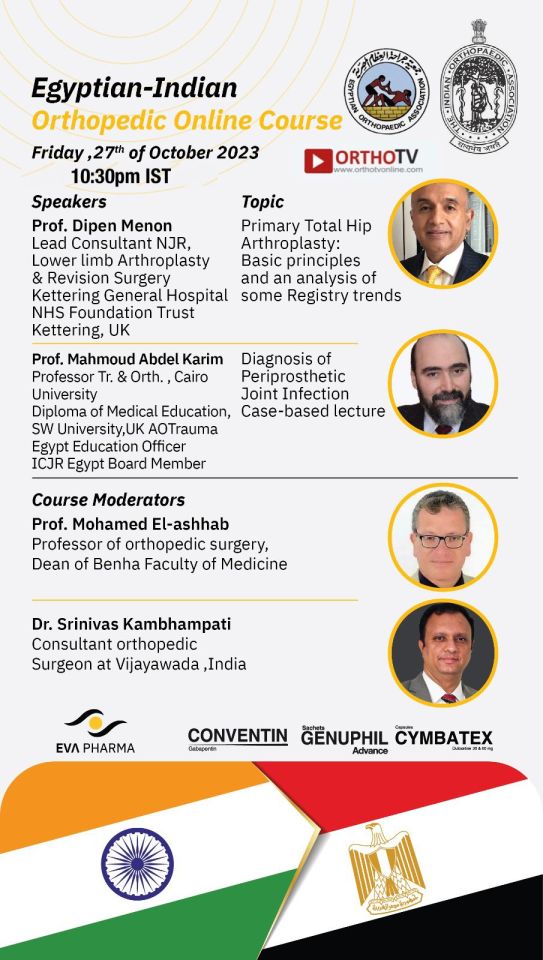
🔰Egyptian-Indian Orthopedic Online Course
🗓️ Date & time : Friday, 27th of October 2023, 10:30 pm IST
▶️ Click here to watch : https://tinyurl.com/OrthoTV-Egyptian-Indian-23
🔅 Topic : Primary Total Hip Arthroplasty: Basic principles and an analysis of some Registry trends
📢 Speaker📢
👨⚕️ Prof. Dipen Menon - Lead Consultant NJR, Lower limb Arthroplasty & Revision Surgery Kettering General Hospital NHS Foundation Trust Kettering, UK
🔆 Topic : Diagnosis of Periprosthetic Joint Infection Case-based lecture
📢 Speaker📢
👨⚕️ Prof. Mahmoud Abdel Karim - Professor Tr. & Orth., Cairo University Diploma of Medical Education, SW University, UK AOTrauma Egypt Education Officer ICJR Egypt Board Member
🔆 Course Moderators
👨⚕️ Prof. Mohamed El-ashhab
Professor of orthopedic surgery, Dean of Benha Faculty of Medicine
👨⚕️ Dr. Srinivas Kambhampati
Consultant Orthopedic Surgeon at Vijayawada ,India
📺Streaming Live on : OrthoTV and IOATV
🤝 OrthoTV Team: Dr Ashok Shyam, Dr Neeraj Bijlani
👨💻 Join OrthoTV - https://linktr.ee/OrthoTV
#OrthopedicCourse #TotalHipArthroplasty #PeriprostheticJointInfection #Orthopedics #MedicalEducation #OnlineCourse #OrthoTV #IOATV #OrthopedicSurgery #HealthcareEducation #MedicalWebinar #OrthopedicExperts #SurgeryTrends #MedicalConference #OrthopedicLearning #EgyptianIndianOrthoCourse #MedicalWebinar2023 #OrthopedicRegistryTrends
0 notes
Text

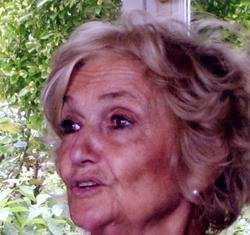
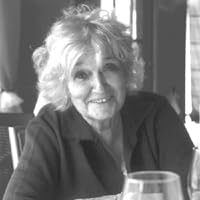

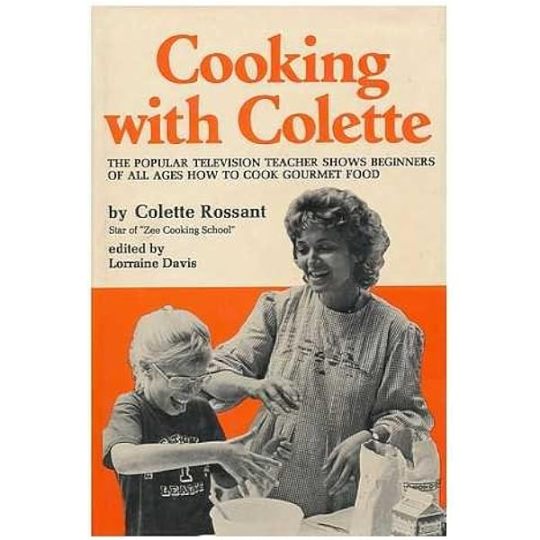


Arrivals & Departures 1932 - 12 October 2023 Collette Rossant
Colette Rossant (born 1932) is a French-American cookbook author, journalist, translator, and restaurateur, who is a member of the Pallache family.
Born in Paris, Rossant traveled with her mother to Cairo to live with her father and her father's family during World War II. Her mother spent much of the war in Beirut (part of the French Mandate for Syria and the Lebanon), while her brother Eddy Palacci remained in Paris with their mother's parents.
After World War II, Rossant returned to Paris and lived with her grandmother and brother, joined occasionally by her mother. In Paris, she studied at the Lycée La Fontaine. She spent a year learning English at Roedean School near Brighton, UK. She earned a B.A. in Comparative Literature at the Sorbonne in 1954. She married American architect James Rossant in 1955.
Moving to New York with her husband in 1955, Rossant pursued several careers, often simultaneously like teaching, writing, translating, restaurant business, and raising a family.
Rossant spent many years teaching French. She was first a language instructor at the Browning School (1957–1961). She then taught French at Hofstra University (1961–1970). She became head of the French department at St. Anne's School (1970–1983). Her last position was as Liaison Officer at the New York branch of Crédit Lyonnais (1985–2000).
Exploring New York, Rossant became very interested in bettering the food she found there. She published her first of seven cookbooks in 1975 (and last to date in 1991). Her third cookbook, A Mostly French Food Processor Cookbook (1980) sold more than 50,000 copies and made a name for her in the Food industry. She became "underground gourmet" for New York Magazine in the 1980s. She served as food and design editor for McCalls Magazine (1983–1990). She then became a columnist for the New York Daily News, where she wrote a popular Wednesday column called "Ask Colette." Currently, she contributes to Food Arts and Super Chef magazines.
Rossant helped launch two restaurants in New York. Buddha Green (1998–1999) opened in Midtown Manhattan and featured original, vegetarian "Buddhist" cuisine. Dim Sum Go Go (2000–2003) opened in Chinatown and featured original Imperial Cantonese cuisine, although Rossant has stopped consulting there. Her husband James Rossant helped design both, while son Tomas Rossant helped on the interior at Buddha Green.
Rossant has traveled abroad (often with her husband, whose architectural design work took him to countries like Bhutan, Tanzania, and Turkey). Her lifelong interest in Asian cuisines took her to China and Japan, reflected in her cookbooks and restaurants.Dorceau in Orne, France, near Rossant's home since 2002
With children grown and married, Rossant's most recent books have been memoirs: Apricots on the Nile (2004, originally published as Memories of a Lost Egypt in 1999), Return to Paris (2003), and The World in My Kitchen (2006).
In 2002, Rossant moved from New York back to France, but rather than return to Paris again (as she had as a teenager), she went to live in the department of Orne, two hours west of Paris. In 2009, Rossant's husband of 55 years died. She continues to live in their home near Condeau, France, on whose town council she has served. She continues to contribute to Super Chef, Food Arts, and Pays du Perche magazines and is writing a twelfth book.
In November 2010, Rossant received the Prix Eugenie Brazier for the French translation of her first memoir, Mémoires d'une Egypte perdue (Editions Les Deux Terres 2010).
Rossant appears during an interview in Rebekah Wingert-Jabi's 2015 documentary Another Way of Living: The Story of Reston, VA, along with excerpt of an interview with late husband James
1 note
·
View note